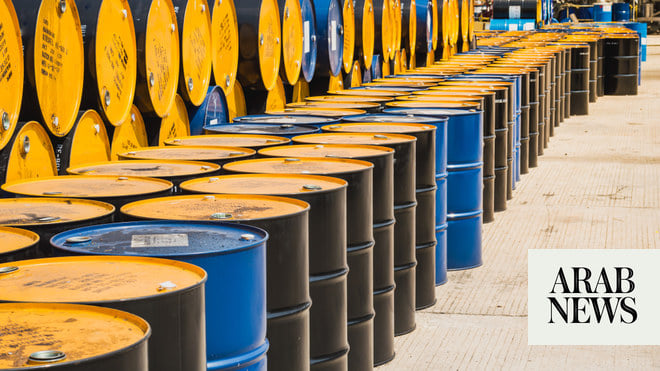
EU leaders will consider whether to impose an oil embargo on Russia over its invasion of Ukraine as they gather this week with US President Joe Biden for a series of summits designed to harden the West’s response to Moscow.
Seeking to force a military withdrawal from Ukraine by Russian President Vladimir Putin, the EU — along with Western allies — has already imposed a panoply of punishing sanctions including the freezing of the assets of the Russian central bank.
“We are working on the fifth round of sanctions and many new names are being proposed,” a senior EU diplomat said on condition of anonymity because the discussions are not public.
Saudi Arabia now the top crude oil supplier to China
Saudi Arabia has regained the spot as China"s top crude supplier in the first two months of 2022, having been leapfrogged by Russia in December, while Russian shipments dropped 9 percent as a cut in import quotas led independent refiners to scale back purchases.
Arrivals of Saudi crude totaled 14.61 million tonnes in January-February, equivalent to 1.81 million barrels per day, down from 1.86 million bpd a year earlier, data from the General Administration of Customs showed on Sunday.
Imports from Russia totaled 12.67 million tonnes in the two months or 1.57 million bpd. That compares to 1.72 million bpd in the corresponding 2021 period.
Chevron pulls union workers from California refinery ahead of strike
Union workers were removed from a Chevron Corp. oil refinery near San Francisco hours ahead of a deadline to begin the first labor strike at the gasoline producing plant in more than 40 years.
More than 500 United Steelworkers members were bussed out of the plant Sunday evening and replaced by non-union staff. No new contract talks are planned, said USW Local 5 First Vice President B.K. White in an interview.
The existing labor contract at the Richmond, California, refinery expired Feb.1, and efforts since then failed to reach an agreement. The union twice voted to reject the company’s offers.
“The union’s demands exceeded what the company believes to be reasonable and moved beyond what was agreed to as part of the national pattern bargaining agreement,” Chevron spokesperson Tyler Kruzich said.
Chevron, he said, “is committed to continuing to negotiate toward an agreement” and has taken steps to continue normal operations at the facility.
The last strike at the 245,000 barrel-per-day plant, which produces gasoline, jet fuel, and diesel fuel, took place in 1980 as part of a nationwide walkout.
Brazil cannot add oil to the market any faster, says regulator
Brazil this decade expects to gradually add 3 million barrels per day of oil and gas to its production but cannot speed up those plans to offset a ban on Russian oil, top oil regulator Rodolfo Saboia told Reuters last week.
One of the largest and fastest-growing non-OPEC oil producers, the South American country is expected to pump significantly more oil in the next two years at a time when buyers are searching for supplies to replace Russian crude blacklisted over its invasion of Ukraine.
Brazil"s geology and supply chain constraints mean it can take up to 10 years to place new projects into production, he said. Its oil largely comes from deepwater fields that require expensive platforms and subsea components, Saboia said.
"Production will grow, but there isn"t much that can be done to accelerate it," added Saboia.
Norway’s Equinor shuts Snorre B oil platform
Norway’s Equinor has shut its Snorre B oil platform as a precautionary measure following an earthquake in the North Sea, although no damage has been reported so far, the company said on Monday.
It was not yet clear when Snorre B, which produces between 30,000-35,000 barrels per day of oil, could resume normal operation, Equinor spokesperson Gisle Ledel Johannessen said.
“Our focus now is on the safety. At Snorre B, the production has been shut down as a precaution,” he said.
The quake, which took place early on Monday, had an estimated magnitude of 4.6, according to the Norwegian National Seismic Network.
Little impact on Russia
The refusal by the US and Britain to purchase Russian oil would have little impact on Moscow because they only buy small amounts of Russian crude, Deputy Prime Minister Alexander Novak said on Monday, according to Interfax news agency.
Novak said Russia was in the process of resolving logistical issues linked to its oil shipments abroad and that the country’s oil and gas production was continuing as usual despite sanctions.
He also said it is impossible for Europe to refuse Russian gas for now.
Oil embargo will hurt Europe, says Kremlin
The Kremlin said on Monday Europe would be hit hard in the event of an embargo on Russian oil, striking the continent’s energy balance, but would not affect the US.
Some EU foreign ministers are pushing for an oil embargo as part of a possible fifth round of sanctions against Russia, in an effort to punish Moscow over events in Ukraine.
“Such an embargo would very seriously impact the global oil market, very badly impact energy balance on the European continent,” Kremlin spokesperson Dmitry Peskov told reporters on a daily conference call.
Oil prices climb
Oil prices jumped $3 on Monday, with Brent above $110 a barrel, as a weekend attack on Saudi oil facilities caused jitters.
Brent crude futures climbed $3.44, or 3.2 percent, to $111.37 a barrel by 0443 GMT, adding to a 1.2 percent rise last Friday.
US West Texas Intermediate crude futures rose $3.54, or 3.4 percent, to $108.24, extending a 1.7 percent jump last Friday.
(With input from Reuters)












